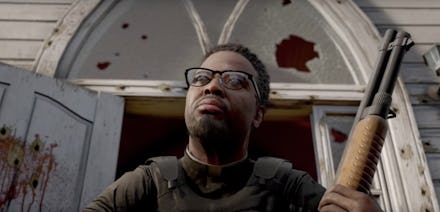The backlash to 'Far Cry 5' is pure hypocrisy — and it's time to stop

Ubisoft’s newest addition to the Far Cry series has a lot of people talking — some shouting and others in a full-on fit over the choice of enemies in Far Cry 5. For the first time in the franchise, you won't be shooting at ambiguously brown enemies as they yell at you in some foreign language.
This time, the enemy is a fanatic Christian cult led by a white man bent on bringing about the apocalypse. The setting is rural America. And for a lot of white male gamers, this is personal.
Unsurprisingly, Far Cry 5 has generated a lot of negative feedback from the usual dark, rambling corners of the internet, resulting in petitions, Twitter threads and wailing YouTube screeds about the unfairness of gunning down a villain who resembles many rural white American men.
What is surprising, though, is that these are the same people you can usually expect to yell "snowflake" whenever someone complains about how their cultural identity is depicted, vilified or overlooked in games.
Even more hypocritical: Far Cry 5 has offended the sensibilities of the same people who don't say a word of support and often harass POC gamers when they talk about lack of representation in mainstream games.
Then there's that ridiculous petition. It may be tempting to laugh it off as a joke — and it very well may be a hoax — but it's a mistake to ignore its underlying message. The absurd line claiming that gamers suffer from "the continued rejection of romantic partners when they find out our hobby" is a key example. Some have argued it's proof the entire petition should be dismissed, but fear of violence from rejected men is a legitimate safety concern.
And yes, the comments are mostly taking the piss out of the petition — but the overblown response it received is a symptom of the bigger issue of who attention and who gets ignored. When white gamers rant and rave about representation in a game, they immediately get our attention; when people of color do it, they usually get ignored.
I experienced this for myself firsthand after writing a Polygon article about the way Watch Dogs 2 handles issues of racism and microaggressions. (The game did an impressive job, thanks to a mix of humor and subtle-but-telling moments.) The response was… well, see for yourself.
There’s an entitlement problem in gaming when it comes to how people are seen and portrayed, and it boils down to who gets to have their say and who doesn't. A small, noisy portion of the gaming community believes they're the true and core audience — the base that will make or break a game's sales. They believe that pure anger and ethically questionable consumer revolts can sway an entire industry.
This shouldn't be news to anyone even slightly involved in the gaming community.
When Rust, an online survival game, automatically generated each player's character — including their race — at random, the reaction was "messy," to say the least. White players actively complained about being forced to play as a black character (though the inverse is something black gamers have to deal with on a regular basis). Rust's lead developer even noted an increase in the use of the N-word during in-game chat after the feature was introduced.
More recently, there was a semi-organized movement against Mass Effect: Andromeda for pushing a supposedly liberal agenda. And before that, there was the laughable attempt to get Mafia III canceled. Why? Because the game has a black lead. That's it. Not because people didn't like the quality of the gameplay — but because, for once, white players weren't represented by the skin color of the game's hero.
This type of hypocrisy isn't limited to games that flip the narrative with nonwhite lead characters either. Last year, when Battlefield 1 was released, people actually claimed that the game was "blackwashing" history. Let that sink in. Some folks will go so far as to make up a ridiculous term based on a real issue like whitewashing just to complain about a game that used a historically accurate group of black soldiers in its advertising.
At the end of the day, white male gamers are struggling to deal with a shifting industry that's become increasingly welcoming of players who look different. When a group has been told for decades that they are the assumed default, the shift toward more diverse characters can be jarring. But the way people deal with this change is what matters, and much of the response to Far Cry 5 ranges from disappointing to flat-out horrifying.
White men love to argue that games aren't "political" when they're the heroes, but when they become the bad guys it's no longer just a game to them. Funny how when things hit a little too close to home, suddenly it's a serious issue that warrants real rage. Hypocrisy is such a bad look, and it's time we confronted it in gaming once and for all.